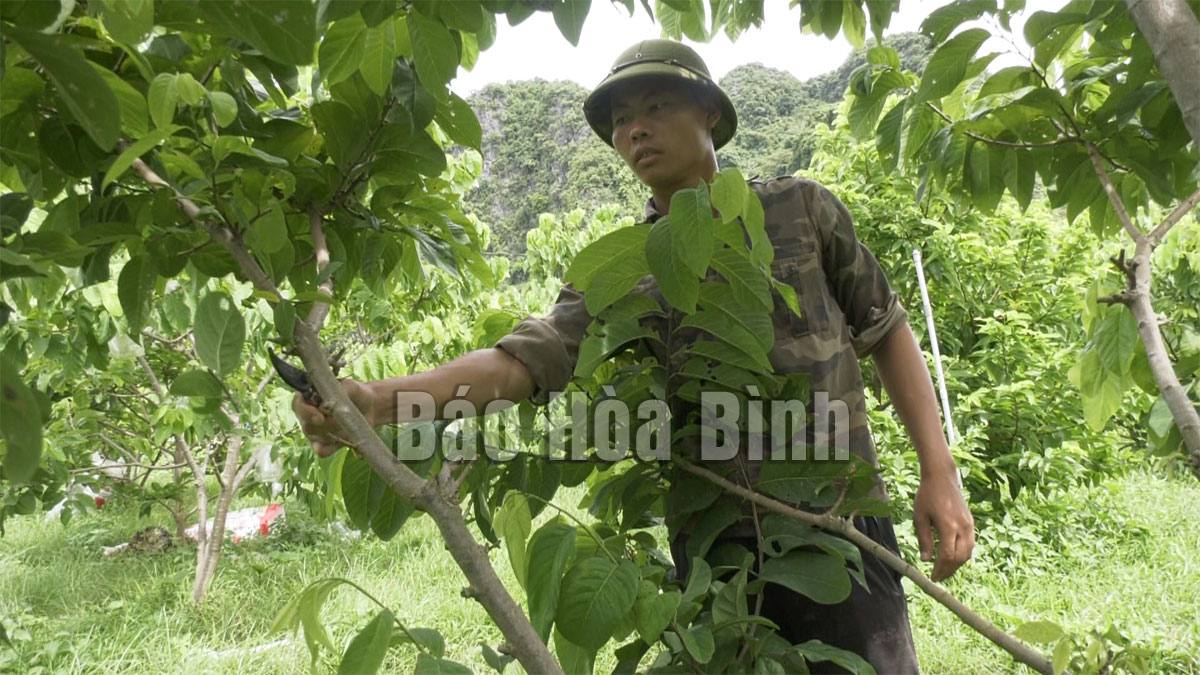
(HBO) - Bui Van Chung took a bold step in introducing the Thai custard apple to his poor farming commune in Yen Thuy district, and his effort has paid off.
The model of growing Thai custard
apple has produced high economic benefits to Bui Van Chung and his family in Da
Phuc commune, Yen Thuy district, Hoa Binh province.
In the search for a new farming model and increase income, in 2017, Chung
rented land in Bao Hieu commune for 50 years to start piloting the cultivation
of high economic value plants and animal husbandry. During the first year, he
planted asparagus and raised farm chickens, but the profit was not as he
expected. In 2018, he decided to switch to growing Thai custard apple on two
hectares of land. He invested in 500 trees and an automatic sprinkler
irrigation system to save labor and production costs. He himself learned
techniques of planting and caring for the fruit trees on the internet. In the
next two years, he planted an additional 1,500 Thai custard apple trees.
By now, after nearly four years of planting and learning, he has drawn a lot of
experience. Chung said that after 3 years, the trees began to give fruit. Each
tree yields about 10 kg of fruit, with the best quality fruit selling for
60,000 VND/kg. "This harvest I have earned 250 million VND in profit from the
fruit, excluding expenses,”he said.
According to Chung, compared to many
other kinds of fruit trees planted in the locality, Thai custard apple has
various advantages, one of which is higher profit. The tree can bear
fruit twice a year, so farmers can ensure stable income. Therefore, in the
coming time, he will continue to plant this fruit tree on the entire area of
the family's land.
Besides expanding the area of Thai custard apple trees, Chung also
invests in animal husbandry, earning a total annual income of about 300-400
million VND./.
Hoa Binh province is undergoing a dynamic transformation amid Vietnam’s national digital transition. Building on Poliburo’s Resolution No. 57-NQ/TW on breakthroughs in science, technology, innovation, and national digital transformation, the province has rolled out a wide range of practical action plans. A standout initiative is the "Digital Literacy for All” movement, an effort to ensure that no one is left behind in the digital era.
Hoa Binh province is undergoing a dynamic transformation in the wake of the national digital transformation movement. Building on Resolution No. 57-NQ/TW of the Politburo on breakthroughs in science, technology, innovation, and national digital transformation, the province has implemented a wide range of practical action plans. A standout initiative is the "Digital Literacy for All” movement ambitious effort to ensure that no one is left behind in the digital age.
With a spirit of unity and proactive problem-solving, the Party Committee, the government and the people of Dong Lai Commune (Tan Lac District) have made great strides in implementing the resolutions of the 24th Party Congress of the commune for the 2020 - 2025 term. Focusing on leadership and practical actions, the commune has brought the Party’s resolutions into daily life, creating strong impacts and pushing the local development forward.
Amid the nationwide push for digital transformation, young people in Hoa Binh Province are stepping up as dynamic pioneers, applying technology to enhance Youth Union operations and expand the reach of youth-led initiatives. Through creativity and adaptability, Youth Union organizations at all levels have introduced a series of practical solutions, contributing to modern governance and community development.
In recent years, An Nghia commune, located in Lac Son district, has stepped up administrative reform, focusing on improving the quality and efficiency of its single-window service unit for receiving and processing administrative procedures. These improvements have helped create favourable conditions for local residents and organisations to handle administrative procedures, contributing to the commune’s broader socio-economic development.
The Prime Minister-approved master plan to develop the multi-use value of forests ecosystems through 2030, with a vision to 2050, aims to improve the management and sustainable use of forest resources, create jobs, increase incomes, and improve the living standards of ethnic minorities, people in mountainous and remote areas, forest workers and those living near forests.



